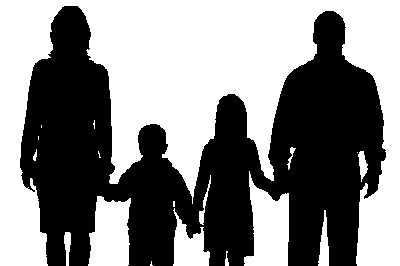Family Education - In a Secular Society
This is the second of two articles on family
education from a Christian perspective in the light of significant
social changes currently being experienced in Western nations.
In the previous
article we considered four key Bible passages which provide important
insights into the place of the family with special regard to the
education of children. This article discusses why it is important
that Christians understand the nature of the current threat to the
established freedom of parents to teach their children “in
conformity with their own religious and philosophical
convictions.”[1]
Understanding the
times
This
phrase is part of the description of the sons of Issachar in 1
Chronicles 12:32, who are listed amongst the mighty men who had
rallied to David. Their understanding of the times equipped them “to
know what Israel ought to do.” Over the last hundred years
there have been multiple changes in society, and at a pace which
leave many wondering what is happening. For Christians, perhaps the
most striking change is that once “Christian” nations
have enthusiastically embraced secularism.
 In
times like these, Christians need to understand what their God is
doing and how they should respond. Many hope He will call a halt to
the rush into unbelief, but if we are honest there seems very little
to suggest that He will. Some may feel rather like the Israelites in
the time of Haggai, who had looked for much but seen little by return
(1:9). Many have prayed and prayed for revival, but there is no sign
of national repentance. Should we continue to live in hope, or be
preparing for more difficult days ahead? Does the Bible shed any
light on the realities of today’s post-Christian nations?
In
times like these, Christians need to understand what their God is
doing and how they should respond. Many hope He will call a halt to
the rush into unbelief, but if we are honest there seems very little
to suggest that He will. Some may feel rather like the Israelites in
the time of Haggai, who had looked for much but seen little by return
(1:9). Many have prayed and prayed for revival, but there is no sign
of national repentance. Should we continue to live in hope, or be
preparing for more difficult days ahead? Does the Bible shed any
light on the realities of today’s post-Christian nations?
In Romans
1 Paul described what had happened previously, and will always
happen, when a society chooses to forget their Creator. From v18 he
recounted how The LORD makes known His contempt for human ungodliness
and unrighteousness. Twice he wrote that when a society turns from
God, He gives them up to the forms of immorality which have
risen to prominence in Western culture in recent years. Paul further
warned that if they did not learn from this, God would then give them
over to a debased mind (v28), resulting in an increase in
unrighteousness. Whilst the catalogue of their wilful rebellion is
awful, Paul's conclusion is even more alarming, “knowing the
righteous judgement of God, that those who practise such things are
deserving of death, not only do the same but also approve of those
who practise them.” Is this why we now find ourselves living in
a society where bad is called good, and good is being outlawed as bad
(Isaiah 5:20)?
The
relevance of this to education and parenting is that increasingly the
state is requiring that children be taught this inversion of
righteousness. This being so, we must ask, “What should God’s
people do?”
In Loco Parentis or In Loco Civitatis?
The previous article
considered the Biblical understanding that education is primarily the
responsibility of parents. This foundation has underpinned the
British state education system since it began in 1870. It is also
embedded in Human Rights conventions; for example Article 26 of the
Universal Declaration of Human Rights states, “Parents have a
prior right to choose the kind of education that shall be given to
their children.”[2]
 One
author pointed out in 2014 that the then Education Secretary, Michael
Gove, had just signalled a significant departure from this
established position. Educationalist Prof. John Howson, a former
chief adviser to the government, questioned the previous day’s
announcement that in future, independent schools “must meet
basic standards of promoting British values.” In his article
entitled, “Re-writing the rule book on education”[3]
he criticised the implications of this change, which he described as
putting the “Education Secretary in
charge of all education content in England,”
[emphasis added]. Whilst recognising that many parents “passed
the obligation to educate their children to the state,” Howson
saw the government’s quiet grab for educational power as a
worrying development.
One
author pointed out in 2014 that the then Education Secretary, Michael
Gove, had just signalled a significant departure from this
established position. Educationalist Prof. John Howson, a former
chief adviser to the government, questioned the previous day’s
announcement that in future, independent schools “must meet
basic standards of promoting British values.” In his article
entitled, “Re-writing the rule book on education”[3]
he criticised the implications of this change, which he described as
putting the “Education Secretary in
charge of all education content in England,”
[emphasis added]. Whilst recognising that many parents “passed
the obligation to educate their children to the state,” Howson
saw the government’s quiet grab for educational power as a
worrying development.
Whilst Gove’s
announcement did not begin the process of shifting educational
responsibility from its Biblical foundation, it did signal that the
state was now prepared to demand that all who had not already done so
should conform to their zeitgeist. For instance Howson then asked,
“And what about the home schoolers, are they now also to be
monitored for British values, and parents told they cannot continue
if Ofsted doesn’t think they are British enough?” He
continued, “I am not sure that I subscribe to such a
totalitarian attitude, where a politician can decide on what
represents British values, and prevent a parent from espousing any
other set of values that is within the law.” His concerns were
justified in April 2018, when the Department for Education announced
a Call for Evidence on Elective Home Education. In the associated
Draft Guidelines, a “suitable education” is in part
defined as the requirement not to teach anything which is “in
conflict with ‘Fundamental British Values’ as defined in
government guidance”.[4]
Standing Up for Parental Responsibilities
The journey from the foundation of
godly family education to increasingly state-dominated secular
education started slowly as far back as the late 1700s, but has now
gathered pace. For a long time there was no significant conflict
between state education and the values which Christian parents sought
to pass on to their children. That is no longer so; Biblical morality
is now considered oppressive, unloving and intolerant. The reality
however is the very opposite, with “tolerance,” as Howson
identified, being imposed by totalitarian means. One matter of
concern is that many church leaders didn’t see this danger
coming and more worryingly, that some are now seeking to embrace it
as good. Faced with such changes, it is important for Christians to
ask themselves if they can allow the state’s assumption that it
has the right to impress secular values upon every child to continue
unchallenged, especially when those values contradict those of their
parents.
 The
hearts and minds of future generations are being fought over right
now. Lord Soley, who introduced a Private Member's Bill [5]
to bring in greater state oversight of home educators in 2017, is
associated with both Humanists UK and the National Secular Society.
Both groups have been conducting campaigns against faith schools and
home education. Successive heads of Ofsted have repeatedly called for
home educators to be registered. Sir Michael Wilshaw claimed that
some parents are radicalising their children. His successor, Amanda
Spielman, is calling for the state to exhibit “muscular
liberalism,”[6] which she defines as
maintaining “our openness and tolerance” and holding “no
truck for ideologies that want to close minds or narrow opportunity.”
Read her speeches, and you will see from the context that she is
talking about parents and schools with clear convictions arising from
their faith. This desire to embed secular values and morals into
children’s minds appears increasingly to be a key reason why
many schools with a religious background are coming under pressure to
teach a morality contrary to the beliefs of their proprietors and
parents.
The
hearts and minds of future generations are being fought over right
now. Lord Soley, who introduced a Private Member's Bill [5]
to bring in greater state oversight of home educators in 2017, is
associated with both Humanists UK and the National Secular Society.
Both groups have been conducting campaigns against faith schools and
home education. Successive heads of Ofsted have repeatedly called for
home educators to be registered. Sir Michael Wilshaw claimed that
some parents are radicalising their children. His successor, Amanda
Spielman, is calling for the state to exhibit “muscular
liberalism,”[6] which she defines as
maintaining “our openness and tolerance” and holding “no
truck for ideologies that want to close minds or narrow opportunity.”
Read her speeches, and you will see from the context that she is
talking about parents and schools with clear convictions arising from
their faith. This desire to embed secular values and morals into
children’s minds appears increasingly to be a key reason why
many schools with a religious background are coming under pressure to
teach a morality contrary to the beliefs of their proprietors and
parents.
Across society the pressure has
increased for Christians to abandon Biblical values and to accept as
good all forms of immorality. There is nothing unusual in that, but
we have now reached a point where it is becoming compulsory to
celebrate immorality. Not satisfied with the freedom to behave
in this way, activists now seek to coerce everyone to approve
what is wrong. Freedom of thought and religion are almost eroded, and
“compelled speech” is becoming mandatory! It has to be
asked if Christians are prepared to “stand in the gap”
(Ezekiel 22:30), not just for their own personal freedoms but also
for future generations. No doubt many of those who are motivating
these changes believe that they are for the good of mankind, but so
did the builders of the Tower of Babel and those global rulers
described in Psalm 2 who took “counsel together, against The
LORD and against His Anointed, saying, ‘Let us break Their
bonds in pieces and cast away Their cords from us.’”
Ask Him to be gracious to the children
Whilst most Christians did not see
these changes coming, they are now well and truly in place. Though
state education had its roots in Christian compassion for all
children, regrettably it was not built on solid Biblical foundations.
When parents ask the state to fund and manage the education of their
children, it could be argued that they have no grounds for complaint
when it teaches them contrary to their convictions. So what seemed
like a good thing at the start has now turned sour, with parents’
freedom to withdraw their children from various subjects increasingly
being removed. And even when parents invest in independent education,
such schools too are now required to teach the inverted morals
prescribed by the state. The only remaining form of education in
which the state has not yet managed to dictate the curriculum is home
education.
In parallel with the rising
popularity of home education around the world, parents in this sector
are coming under increasing pressure in many places. There are
sustained campaigns to subject home educators to state monitoring in
England and Wales. In Scotland it is the Named Person scheme which
remains a threat to a broad range of parental freedoms, including
home education. All serious Christian parents surely aspire to raise
their children in the discipline and instruction of The LORD, but
sadly, many do not appreciate that home education has become the last
remaining educational setting in Britain where this may be undertaken
without compromise. Such freedom is no longer available in state
schools, and is also being eroded in independent schools. Christian
home educators long for other believers to join with them in praying
that The LORD will be gracious to the children of today and tomorrow.
 If
you know Christians who home educate, do pray for them as they seek
to raise their children in the discipline and instruction of the
Lord, and do ask them about the situation where they are - it differs
in each of the devolved nations in Britain. Sadly, Christian home
educating families have frequently been perceived as unnecessarily
“different,” and the media has recently been used to
portray home education as a danger to children. It’s so
important however to remember that the real danger comes from those
who seek to teach everyone’s children
that there is no God, and they can live as they please. King
David rhetorically asked, “If the foundations are destroyed,
What can the righteous do?” (Psalm 11:3) One objective,
identified in the first of these studies, would be to pray that
fathers’ hearts would turn back to their children and their
children’s hearts back to their fathers. Praying
that the freedom to home educate children in the UK without state
intervention would be maintained could be a valuable first step
towards that goal.
If
you know Christians who home educate, do pray for them as they seek
to raise their children in the discipline and instruction of the
Lord, and do ask them about the situation where they are - it differs
in each of the devolved nations in Britain. Sadly, Christian home
educating families have frequently been perceived as unnecessarily
“different,” and the media has recently been used to
portray home education as a danger to children. It’s so
important however to remember that the real danger comes from those
who seek to teach everyone’s children
that there is no God, and they can live as they please. King
David rhetorically asked, “If the foundations are destroyed,
What can the righteous do?” (Psalm 11:3) One objective,
identified in the first of these studies, would be to pray that
fathers’ hearts would turn back to their children and their
children’s hearts back to their fathers. Praying
that the freedom to home educate children in the UK without state
intervention would be maintained could be a valuable first step
towards that goal.
«
Previous Article | Section Index
©
Copyright Randall Hardy – September 2018
This paper
may only be reproduced in its entirety for private
non-commercial use.
All other usage requires the written
permission of the author.
Email
the author
Home
Education Index
Amen
Home Page
 In
times like these, Christians need to understand what their God is
doing and how they should respond. Many hope He will call a halt to
the rush into unbelief, but if we are honest there seems very little
to suggest that He will. Some may feel rather like the Israelites in
the time of Haggai, who had looked for much but seen little by return
(1:9). Many have prayed and prayed for revival, but there is no sign
of national repentance. Should we continue to live in hope, or be
preparing for more difficult days ahead? Does the Bible shed any
light on the realities of today’s post-Christian nations?
In
times like these, Christians need to understand what their God is
doing and how they should respond. Many hope He will call a halt to
the rush into unbelief, but if we are honest there seems very little
to suggest that He will. Some may feel rather like the Israelites in
the time of Haggai, who had looked for much but seen little by return
(1:9). Many have prayed and prayed for revival, but there is no sign
of national repentance. Should we continue to live in hope, or be
preparing for more difficult days ahead? Does the Bible shed any
light on the realities of today’s post-Christian nations? One
author pointed out in 2014 that the then Education Secretary, Michael
Gove, had just signalled a significant departure from this
established position. Educationalist Prof. John Howson, a former
chief adviser to the government, questioned the previous day’s
announcement that in future, independent schools “must meet
basic standards of promoting British values.” In his article
entitled, “Re-writing the rule book on education”
One
author pointed out in 2014 that the then Education Secretary, Michael
Gove, had just signalled a significant departure from this
established position. Educationalist Prof. John Howson, a former
chief adviser to the government, questioned the previous day’s
announcement that in future, independent schools “must meet
basic standards of promoting British values.” In his article
entitled, “Re-writing the rule book on education” The
hearts and minds of future generations are being fought over right
now. Lord Soley, who introduced a Private Member's Bill
The
hearts and minds of future generations are being fought over right
now. Lord Soley, who introduced a Private Member's Bill  If
you know Christians who home educate, do pray for them as they seek
to raise their children in the discipline and instruction of the
Lord, and do ask them about the situation where they are - it differs
in each of the devolved nations in Britain. Sadly, Christian home
educating families have frequently been perceived as unnecessarily
“different,” and the media has recently been used to
portray home education as a danger to children. It’s so
important however to remember that the real danger comes from those
who seek to teach everyone’s
If
you know Christians who home educate, do pray for them as they seek
to raise their children in the discipline and instruction of the
Lord, and do ask them about the situation where they are - it differs
in each of the devolved nations in Britain. Sadly, Christian home
educating families have frequently been perceived as unnecessarily
“different,” and the media has recently been used to
portray home education as a danger to children. It’s so
important however to remember that the real danger comes from those
who seek to teach everyone’s